Decaf coffee often gets a bad reputation — as weak, tasteless, or unnecessary. But modern decaffeination methods and quality sourcing have changed the game. Today’s decaf offers a flavorful, healthful option for those who want the taste of coffee without the jolt of caffeine.
In this article, we explore how decaf is made, what it contains, and why it deserves a spot in your cup.
1. What Is Decaf Coffee?
Decaf coffee is coffee that has had at least 97% of its caffeine removed.
It’s still made from real coffee beans — usually arabica — and contains:
- The same antioxidants
- The same flavor compounds
- Much less caffeine
It’s ideal for people sensitive to caffeine or looking to enjoy coffee later in the day.
2. How Is Coffee Decaffeinated?
There are four main methods for removing caffeine from coffee beans:
- Solvent-based (using methylene chloride or ethyl acetate)
- Swiss Water Process (water and carbon filtration)
- CO₂ Process (pressurized carbon dioxide)
- Triglyceride Process (natural oils)
All methods are safe and approved by global food authorities.
3. Is Decaf 100% Caffeine-Free?
No — decaf still contains 2 to 5 mg of caffeine per 8 oz cup.
For comparison:
- Regular coffee: 70–140 mg
- Espresso: 60–80 mg
- Green tea: 30–50 mg
If you’re highly sensitive or avoiding caffeine for medical reasons, even decaf should be consumed in moderation.
4. Does Decaf Have Health Benefits?
Yes! Decaf retains most of the same antioxidants and polyphenols as regular coffee.
This means it may still support:
- Liver health
- Heart function
- Reduced inflammation
- Lower risk of type 2 diabetes
In some studies, decaf showed comparable results to caffeinated coffee.
5. Does It Taste the Same?
Not always — but it’s getting better.
Modern decaf coffees can be:
- Sweet, rich, and well-balanced
- Slightly less aromatic or bold (depending on the method used)
- Difficult to distinguish in milk-based drinks like lattes or cappuccinos
Specialty roasters now offer high-quality decaf options sourced and roasted with care.
6. Who Should Drink Decaf?
Decaf is a great choice for:
- People with caffeine sensitivity
- Pregnant or breastfeeding individuals
- Those managing anxiety, insomnia, or high blood pressure
- Anyone wanting coffee flavor without stimulation
It also allows for evening coffee rituals without disrupting sleep.
7. Decaf and Sleep Quality
Since it has minimal caffeine, decaf:
- Won’t interfere with melatonin production
- Has little to no effect on sleep latency
- Is a safer choice for afternoon or nighttime consumption
It offers the comfort of coffee with less impact on your circadian rhythm.
8. Decaf and Digestion
Some people find decaf:
- Easier on the stomach
- Less likely to cause acid reflux
- Gentler for those with gastrointestinal sensitivity
If regular coffee upsets your stomach, switching to decaf may help.
9. Decaf and Hydration
Like regular coffee, decaf contributes to your daily hydration. Despite past myths, it does not cause dehydration when consumed in normal amounts.
It’s a great low-calorie beverage that fits well into a balanced diet.
10. Choosing the Best Decaf
Look for:
- Swiss Water or CO₂ processed decaf (for chemical-free options)
- Single-origin or specialty-grade beans
- Freshly roasted decaf from reputable roasters
Treat decaf like any other coffee — with attention to origin, roast, and brew method.
Final Thoughts: Don’t Underestimate Decaf
Decaf coffee is no longer the sad cousin of real coffee. It’s a flavorful, functional, and flexible option that lets you enjoy the ritual — without the rush.
Whether you’re cutting back on caffeine or just want a second (or fifth) cup, decaf is worth your respect — and a place in your brew rotation.







